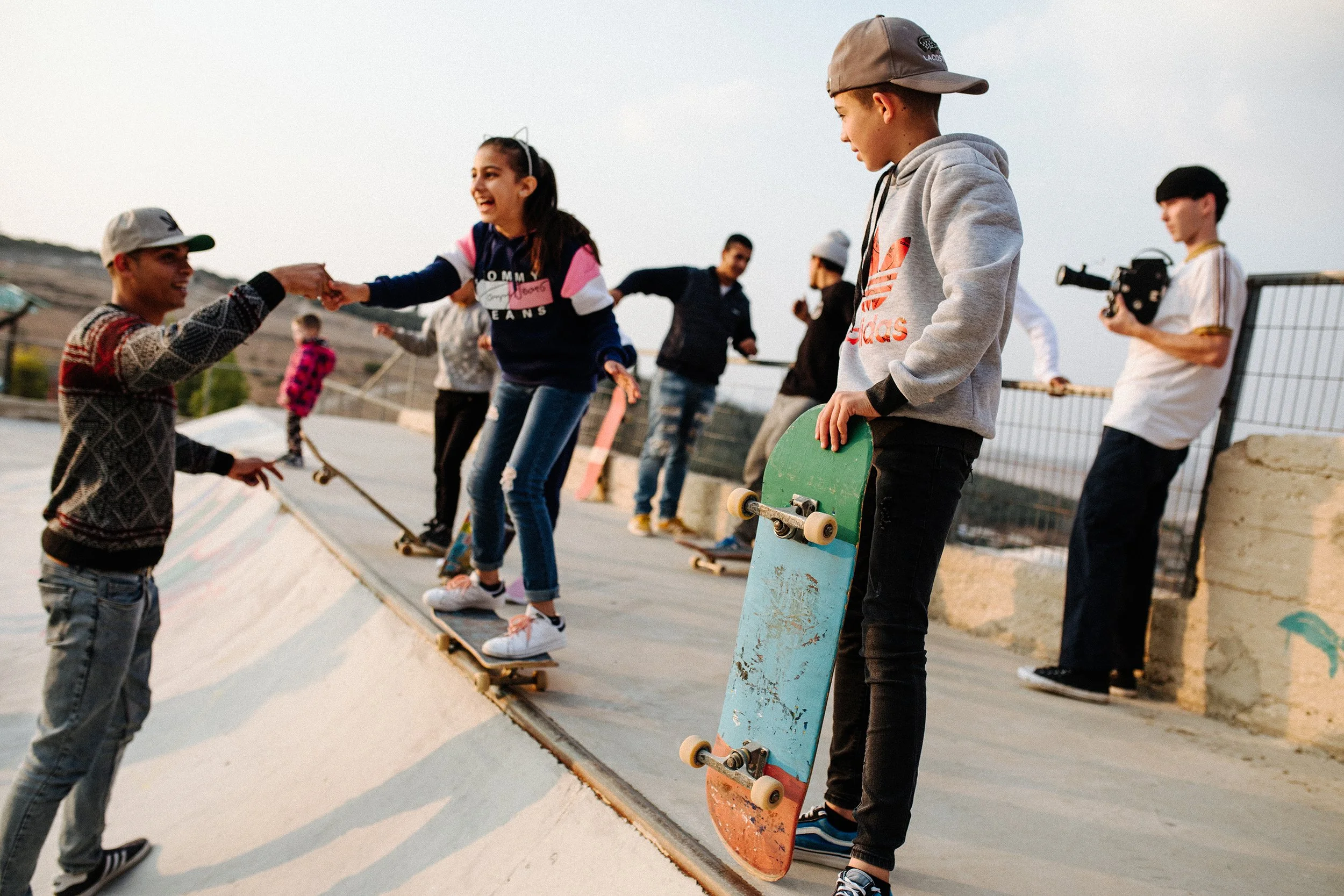What Skateboarding Gives: Advocating for Skateboarding at the Gray Center
Asira Al-Shamaliya Skatepark, Photo: Clément Le Gall
by Mike Schuh
Mike Schuh, Assistant Director, Fellowships and Operations at the Gray Center for Arts and Inquiry, is quick to inform you that he is not a skateboarder—as you’ll read below. But his love of skateboarding and his work with the Gray Center and their flagship publication, Portable Gray, has allowed him to unite the risky and experimental practice of skateboarding with the similarly experimental ethos of the Gray Center’s work. We asked him to reflect on his work in bringing skateboarding and academia together.
I love skateboarding. I am not a skater. I was once, but that is no longer something I can—nor should—claim. What I can claim is that for a long-time, skateboarding has meant a great deal to me. Reading about it, watching videos, talking about it, and thinking about it are all the ways in which I joyfully and critically engage in this thing that does so much to throw our basic understandings of space and function wildly into question.
The opportunities I’ve had to bring skateboarding into the Gray Center have allowed me to shift into the role of advocate. I’ve been a serious appreciator, and an occasional supporter—by way of purchasing goods, as well as an enthusiastic willingness to talk to anyone about why I find skateboarding so meaningful—but never have I been able to advocate for skateboarding in a way that has provided such unique platforms to individuals who are truly and deeply in skateboarding.
Kyle Beachy/Photo: Michael Worful
If I’m writing about skateboarding at the Gray Center, then I’m writing about Kyle Beachy. Kyle first came to my attention when I stumbled upon an article on Jenkem Magazine’s website, right around the time I was introducing skateboarding to my Gray colleagues as a way of thinking about improvisation, architectural intervention, and composition. The article in Jenkem Magazine was an account of a 2019 conference in London called Pushing Boarders that sought to promote expansive and academically-oriented understandings of skateboarding as both an activity and culture.
To date, the Gray Center has supported five separate outputs related to skateboarding, and the mark of Beachy can be found on all of them. No person is reducible to any one or two interests, even passions, but I think it’s pretty safe to describe Kyle as a writer who skates, or skater who writes, depending on what weather and body allow that day. Lucky for us all, if you want to know much, much more about Kyle and his relationship to skateboarding (amongst so many other things) you can check out his very recent and truly wonderful book, The Most Fun Thing: Dispatches from a Skateboard Life.
“Adults fear death (this is why we invented literature). Children, unable to comprehend death, find a suitable surrogate in adulthood. Skateboarders in the meantime worry only over that apocalyptic moment after which we’ll be forced to stop skateboarding. This, we call terror.”
Our advocacy for skateboarding in the academic space started in 2020 when Beachy produced Seven Small Bafflements for the “Reality Theatre” issue of our journal, Portable Gray, an essay that wove personal and formal connections between skateboarding, performance, and marriage. Skateboarding at the Gray Center accelerated through our FarBar program, initiated in 2020 by Interim Director Ghenwa Hayek during the Covid-19 lockdown as a global-facing version of our SIDEBAR series that had sought to support overlooked and underfunded endeavors. In May of 2021, we hosted a FarBar event (online—just like all other series events) organized by Beachy and featuring artist, architect, and professional skateboarder Alexis Sablone in conversation with artist, designer, and skateboarding legend Mark Gonzales. The discussion, moderated by Beachy, centered on competitiveness and creativity. It was conceived as a chance to consider skateboarding’s relationship to these topics in the buildup to the 2021 Summer Olympics, where Sablone would be competing for the United States.
In the spirit of FarBar, I was given the opportunity to expand our coverage of skateboarding in the latest issue of Portable Gray. We were able to include an interview conducted by professional skateboarder Ryan Lay with his friend and SkatePal collaborator Aram Sabbah. SkatePal is a non-profit organization that works with skateboarders and other skate advocates in Palestine to build skateparks and teach skateboarding. Their conversation examines various skate spots that Ryan and Aram have enjoyed in Palestine together, and what it means to be a skater in a country that has so long been oppressed. Additionally, we published a piece that I co-authored with Nick Sharratt, the London-based owner of the online skate shop Palomino. Nick’s shop is committed to supporting independent skate brands from all over the world and is known for having the largest selection of skate publications anywhere. We explored the shifting state of skateboarding today through the guise of skate publications from Sharratt’s personal collection and Palomino’s inventory. Through his archive, we were able to understand how skateboarding has recently begun to evolve into a more inclusive space for those who do not conform to dominant forms of gender, race, and class.
The work we have accomplished thus far in connection with skateboarding has been such a joy, and Beachy’s role in allowing the Gray Center (and myself) to be an advocate can’t be overstated. It was Beachy’s original openness and enthusiasm for what we were trying to do that brought us together with his friends from SkatePal and Palomino, who shared in that same openness and enthusiasm when producing their contributions. It was his passion and years of dedication to skateboarding that allowed us to host skateboarding leaders like Alexis Sablone and Mark Gonzales. Developing these pieces and presentations has been exciting; just as exciting are our continued efforts in making room for skateboarding within the Gray Center’s approach to supporting risky and ambitious creative practices.


